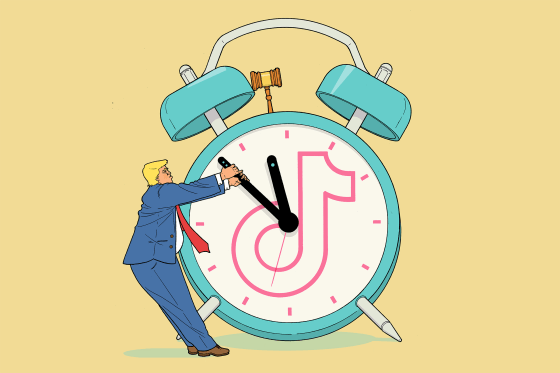After lawyers for TikTok appeared before the Supreme Court on Friday and received a skeptical reception, it seems only a few pathways remain for the platform’s future in the U.S.
If the Supreme Court votes to uphold the law that President Joe Biden signed in April, TikTok will shut down on Jan. 19, the day before Donald Trump takes office. The law requires TikTok to divest from its Chinese ownership and sell to a U.S. company. If the justices declare the law unconstitutional, TikTok can continue to exist as it is today for its 170 million American users — around half of the U.S. population.
But the direction of Friday’s oral arguments put that possibility into question.
There are a few factors that could play into other options. TikTok has asked to extend the timeline of the Supreme Court’s decision, a choice the justices can make to push back their final judgment. Trump has supported TikTok, filing an amicus brief in December to the Supreme Court to advocate for such an extension, which would bring the sale deadline into his presidential term. An extension, he said, would allow his administration (which is divided on TikTok) to pursue a “political resolution” for the app’s future.
It’s not entirely clear what form that would take.
One of Trump’s options would be to grant a 90-day extension for TikTok to continue its effort to find an American buyer — a provision specifically written into the law forcing a sale. However, TikTok’s Chinese parent company ByteDance said it will not approve a sale of the app. If ByteDance were to approve a sale, there are U.S. buyers willing to purchase TikTok, including billionaire business executive Frank McCourt.
Gautam Hans, a professor of law at Cornell University, said TikTok had “a tough go” with the Supreme Court and added he finds it unlikely that the justices will side with the platform. He called Trump’s brief “unprecedented” and said that it’s unclear how Trump will seek a political resolution, with a few unlikely possibilities.
“There might be a possibility that he pressures Congress to rescind the law,” Hans said. “That would be pretty extraordinary, given that the law passed on a partisan basis overwhelmingly. You’d have to have a lot of reversals from legislators to undo the law.”
Hans said that Trump could also direct the Justice Department not to enforce the law, meaning that it would not prosecute Google and Apple’s app stores for hosting the app. But Hans didn’t think that the legal counsel for either company would be comfortable defying the law on Trump’s word alone.
Solicitor General Elizabeth Prelogar, who defended the U.S. government’s position on TikTok to the Supreme Court, indicated during her argument that she believes ByteDance could pivot to selling the company if the law is upheld.
“I think Congress expects we might see something like a game of chicken, ByteDance saying we can’t do it, China will never let us do it,” Prelogar said in court on Friday. “But when push comes to shove and these restrictions take effect, I think it will fundamentally change the landscape with respect to what ByteDance will consider, and it might be just the jolt that Congress expected the company would need to actually move forward with the divestiture process.”
Rita McGrath, the academic director in executive education at Columbia Business School, said that buyers like McCourt are betting that TikTok will decide to sell to a U.S. owner after all, if the company is left with no other options.
“If they do get shut down, which seems to be likely, I think it opens up a second tier of bargaining possibilities,” McGrath said. “TikTok has taken the time - since the law was passed until these court hearings - to not investigate buyers, to not investigate an alternative, to not look into whatever legal remedies they might have. They’ve been going on a lobbying and charm offensive. This is kind of a Hail Mary for them.”
McGrath said that whether TikTok sells or not, she believes creators will be able to transition to alternatives. Platforms like Meta, with Instagram Reels, and Google, with YouTube Shorts, would see an advantage in the short-form video space if TikTok disappears. Still, McGrath said it would be a “loss” for the people who have built up large, profitable and influential TikTok followings.
“Users have real interests here. They are using the platform to communicate, to share content, to discuss, to make money. Shutting this down is going to be a major social, political and economic consequence for those individuals, not just the company,” Hans said. “So that is what I think is going to be really challenging from a First Amendment perspective, the rights and interests of the users, which are really important given there are over 170 million of them in this country that are going to be affected in ways that can’t easily be fixed.”

